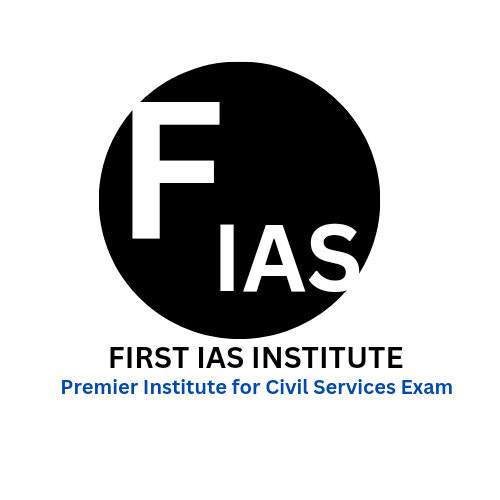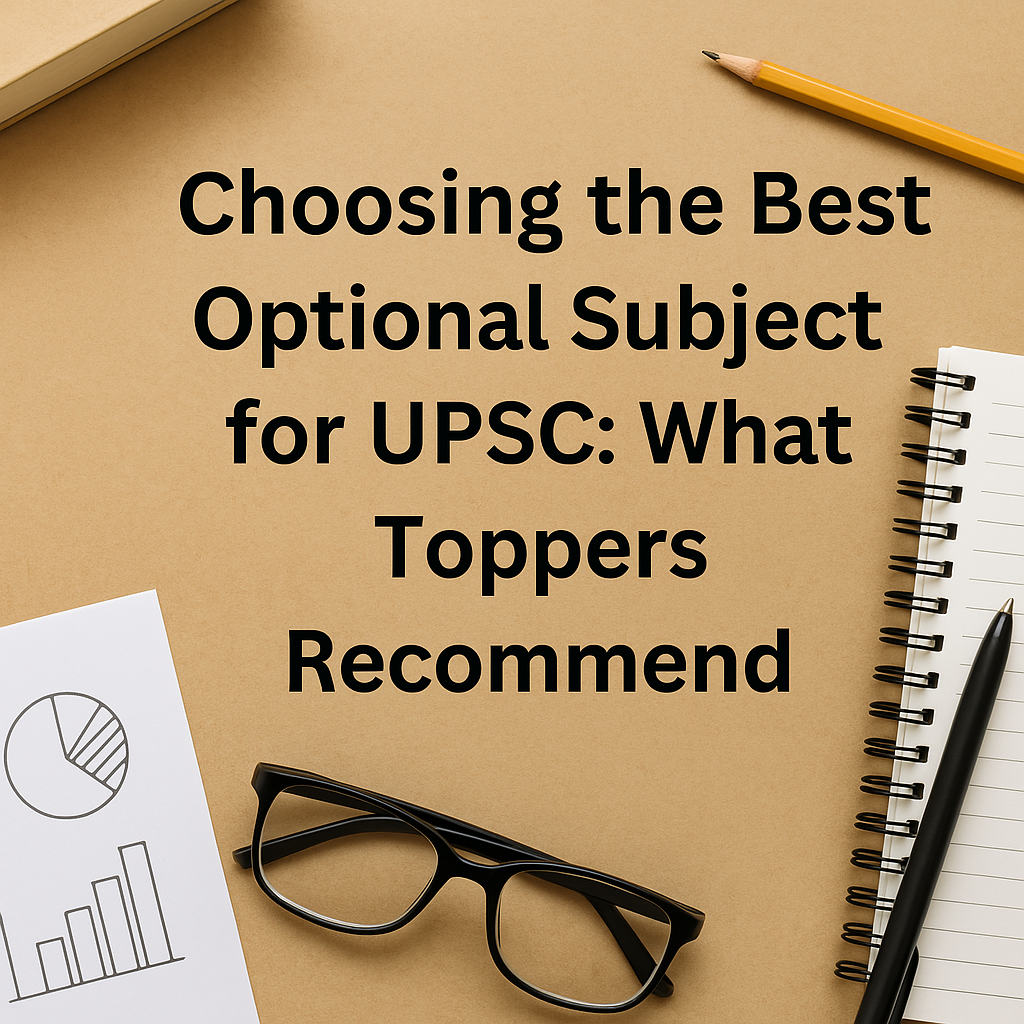Choosing the Best Optional Subject for UPSC: What Toppers Recommend
One of the most critical decisions in your UPSC Civil Services Examination (CSE) preparation journey is selecting the right optional subject for the Mains exam. With 500 marks riding on this choice, the optional subject can make or break your chances of becoming a civil servant. Despite its weightage, aspirants often struggle to choose the best subject that aligns with their strengths and strategy.
In this blog, we’ll explore the most important factors to consider when selecting your optional subject and incorporate valuable insights from successful candidates who have cleared the exam with top ranks. Whether you're from a science, humanities, or commerce background, this comprehensive guide will help you make an informed decision.
Join WhatsApp community for Free Notifications, Updates, Study Material, Mock Tests, Internship Updates, and Current Affairs - CLICK HERE TO JOIN
Why Is the Optional Subject So Important?
The optional paper comprises two papers (Paper I and II), each of 250 marks, contributing a total of 500 marks to the UPSC Mains score. In many cases, the optional subject has played a decisive role in determining the final rank of candidates. While General Studies papers have become increasingly competitive and standardized, the optional paper still offers a scoring opportunity if chosen and prepared wisely.
What Do Toppers Say About Choosing an Optional?
Before diving into detailed factors, here are a few key takeaways from UPSC toppers:
- Anudeep Durishetty (AIR 1, 2017) said he chose Anthropology because of its concise syllabus and high scoring potential.
- Gaurav Agarwal (AIR 1, 2013) chose Economics due to his academic background, which gave him an edge.
- Srushti Deshmukh (AIR 5, 2018) opted for Sociology despite being an engineering graduate, because she found it interesting and manageable.
These examples show there’s no one-size-fits-all approach. The key is alignment—between your interest, aptitude, and resources.
To Enroll in FIRST IAS INSTITUTE - Click Here
Factors to Consider When Choosing the Best Optional Subject
1. Academic Background and Comfort Level
One of the first filters you should apply is your educational background. If you’ve pursued a subject at graduation or post-graduation level, you’re likely to have a head start. Familiarity with concepts, terminologies, and theories will reduce your learning curve significantly.
However, your background shouldn’t be the sole reason. Many candidates choose non-academic subjects due to better scoring trends or personal interest—and succeed.
Toppers’ Insight:
"Coming from a science background, I initially considered Physics, but shifted to Sociology after realizing it was easier to connect with and more relevant to GS papers." – A UPSC Topper (Anonymous)
2. Interest and Curiosity in the Subject
UPSC preparation is a long, often grueling journey. Studying a subject that doesn’t spark your curiosity can lead to burnout and boredom. A subject that genuinely interests you will make self-study easier, improve retention, and keep you motivated through revisions.
Ask yourself:
- Do I enjoy reading this subject?
- Am I curious to explore more about its concepts?
- Can I discuss and write about it without losing interest?
Toppers’ Insight:
"I chose Anthropology purely out of interest. I started reading basic material and realized I enjoyed studying it—it didn’t feel like a burden." – Anudeep Durishetty (AIR 1)
Join WhatsApp community for Free Notifications, Updates, Study Material, Mock Tests, Internship Updates, and Current Affairs - CLICK HERE TO JOIN
3. Scoring Potential and Trend
While UPSC claims to maintain parity, some subjects do display relatively higher scoring trends in specific years. Subjects like Anthropology, Sociology, PSIR (Political Science and International Relations), and Geography have historically shown better results in terms of average marks.
This is not to say technical subjects can’t fetch high marks, but humanities-based subjects tend to be more manageable and offer better results with shorter preparation time.
Toppers’ Insight:
"Geography was my optional because it was not only scoring but also overlapped with GS Paper I and disaster management topics." – A past UPSC candidate
4. Syllabus Length and Manageability
The UPSC exam is vast. When selecting an optional, evaluate how compact and defined the syllabus is. Some subjects have an exhaustive syllabus (e.g., History, Law), while others are concise and easier to finish (e.g., Anthropology, Philosophy).
Make sure you understand:
- The time it will take to complete the syllabus.
- The effort needed for revision.
- The volume of content required for answer writing.
Toppers’ Insight:
"I preferred Philosophy over History because it had a smaller syllabus and was easier to revise multiple times." – A UPSC Mains top scorer
5. Availability of Resources and Guidance
Even the most interesting subject becomes frustrating if you can’t find quality study materials, coaching, or mentorship. Check whether:
- Good books and notes are available.
- Test series or answer writing practice is accessible.
- Reliable coaching (if needed) is available online or offline.
Toppers’ Insight:
"I switched from Public Administration to PSIR after realizing that there was better online content and coaching support available for PSIR." – A candidate who cracked the exam in their second attempt
To Enroll in FIRST IAS INSTITUTE - Click Here
6. Overlap with General Studies and Essay
Subjects that overlap with the GS syllabus can help you optimize your effort. For example:
- Sociology helps in GS Paper I (Society), Essay, and Ethics.
- Geography overlaps with GS Paper I and aspects of disaster management.
- PSIR supports GS Paper II (Polity and International Relations).
Such overlap can reinforce your understanding and save precious time.
Toppers’ Insight:
"I found that Sociology supported my Essay and Ethics papers immensely. It gave me an edge in philosophical and value-based answers." – A UPSC Topper
7. Previous Years' Performance and Question Papers
Analyze the past 3-5 years’ question papers of your shortlisted subjects. It gives you clarity on:
- The kind of questions asked.
- Whether you can attempt them comfortably.
- How repetitive or unpredictable the paper is.
This exercise is crucial to understand whether the subject aligns with your strengths in answer writing.
8. Answer Writing Feasibility
Ultimately, UPSC Mains is a written exam. Your ability to express concepts clearly, structure answers well, and write analytically will determine your marks. Choose a subject where you can:
- Think and write logically.
- Use examples and case studies.
- Write fast and with clarity.
Some subjects are more theory-based (Philosophy, Sociology), while others require analytical thinking and diagrams (Geography, Mathematics). Evaluate your personal style and comfort in answer writing.
Join WhatsApp community for Free Notifications, Updates, Study Material, Mock Tests, Internship Updates, and Current Affairs - CLICK HERE TO JOIN
Final Thoughts: Don’t Follow the Herd
Many aspirants fall into the trap of choosing what’s “popular” or “trending.” What works for one candidate might not work for another. Choosing an optional subject is a deeply personal and strategic decision.
Take time to evaluate:
- Your past academic experience.
- Your interests and aptitude.
- Time available for preparation.
- Quality of resources and mentorship.
A Simple Exercise to Help You Decide
- Shortlist 3 subjects based on initial reading.
- Download the syllabus and previous years’ papers.
- Watch a few topper videos for each subject.
- Skim through basic books or NCERTs.
- Evaluate your comfort level and ability to write answers.
After this exercise, your decision will be clearer and more informed.
To Enroll in FIRST IAS INSTITUTE - Click Here
In Conclusion
The optional subject is a game-changer in your UPSC journey. It’s a unique chance to play to your strengths and differentiate yourself. Choose wisely—based on interest, aptitude, and strategy—not based on hearsay or popularity.
As UPSC toppers have repeatedly shown, there’s no “best” optional subject. The best one is what’s best for you.
So take a deep breath, research well, and make a decision you can commit to. Remember, a well-chosen optional, backed by sincere preparation, can be your ticket to the final list.
Let me know if you'd like a version of this in HTML format or as a downloadable document for your blog.


 firstiasofficial@gmail.com
firstiasofficial@gmail.com
Leave a Comment